Twisting the Tiger’s Tail - Part 1
In 1912, a heckler’s "unprintable" words drove Ty Cobb to violence and sparked a player uprising.
Today’s story is over 100 years old, but its central questions remain, unfortunately, as fresh as ballpark grass.
What can a fan say to a player, and vice versa? What privileges does a ticket bestow on its owner? What is a person required to endure after they put on a team uniform? Who needs protection from whom?
The game that shook baseball to its foundations and threatened a decade of industry peace began at 4:00 PM on May 15, 1912. The setting was Hilltop Park in the Washington Heights neighborhood in Manhattan. From 1903 to 1912, Hilltop was the home to the New York American League franchise, known as the Americans, the Invaders, the Highlanders, and—with increasing frequency as the years passed—the Yankees (easier to fit in a headline).
The late afternoon start time allowed a broad cross-section of New Yorkers to come out to the ballpark, including businesspeople inclined to cut out a little early to catch a game after work. At least one such man of industry took advantage of the opportunity. His name was Ban Johnson and during work-hours he was the founder and president of the American League.
Through four innings, Johnson got exactly what he’d hoped for—nothing special. This was not a marquee match-up in 1912. The Highlanders were a 5-15 club with few interesting players. The Detroit Tigers had a 12-14 record, but the middle of their lineup was pretty good, with George Moriarty, Jim Delahanty, Wahoo Sam Crawford, and one of the best players the game had thus far produced.
Ty Cobb was in the prime of his career in 1912, a 25-year-old avatar of what we now call the Deadball Era. He won a hotly contested and controversial batting title in 1910 and when that contest was reorganized as the first-ever Most Valuable Player Award in 1911, Cobb won handily. Each victory earned him a new Chalmers Model 30 automobile. “His vocation is baseball,” one admiring profiler wrote in May 1912, “but his avocation is winning prize automobiles.”
There was no one else like Cobb in the early 1910s. He had taken a difficult game and twisted it around his thumb and finger. He possessed many physical gifts, yes, but he also had an unusual ferocity and an unmatched strategic intelligence. He charted defenders’ patterns and habits in his head and kept the information filed away for years at a time until it proved useful. You can’t really trust his “caught stealing” numbers because he sometimes got thrown out on purpose (in non-critical situations) to make other teams think he was slower than he actually was. He was known to kick the top of the bases over toward the next base to get an inch or two closer to his target. His fall-away slides were art; brushstrokes painted into the dirt. He hit over .400 three times and won 12 batting titles. One of those .400 seasons was 1911, when he hit .419. When you add in his walks he ended up on base 46% of the time and helped himself to 83 more bases from there.
Cobb the man was dour and hard-bitten, haunted by the ghost of his father (killed by his mother) who’d warned him not to come home a failure but died before he could see Cobb succeed. His utter lack of charm had made him a target as a rookie, when he was subjected to particularly pointed hazing by his new teammates in Detroit, experiences that left him brooding and distant. He had no sense of humor to speak of, thin skin, and a quick, violent temper. Few players, including his own teammates, would ever raise their hand to say that they liked the man, but by 1912 he had long since earned their respect and even admiration.
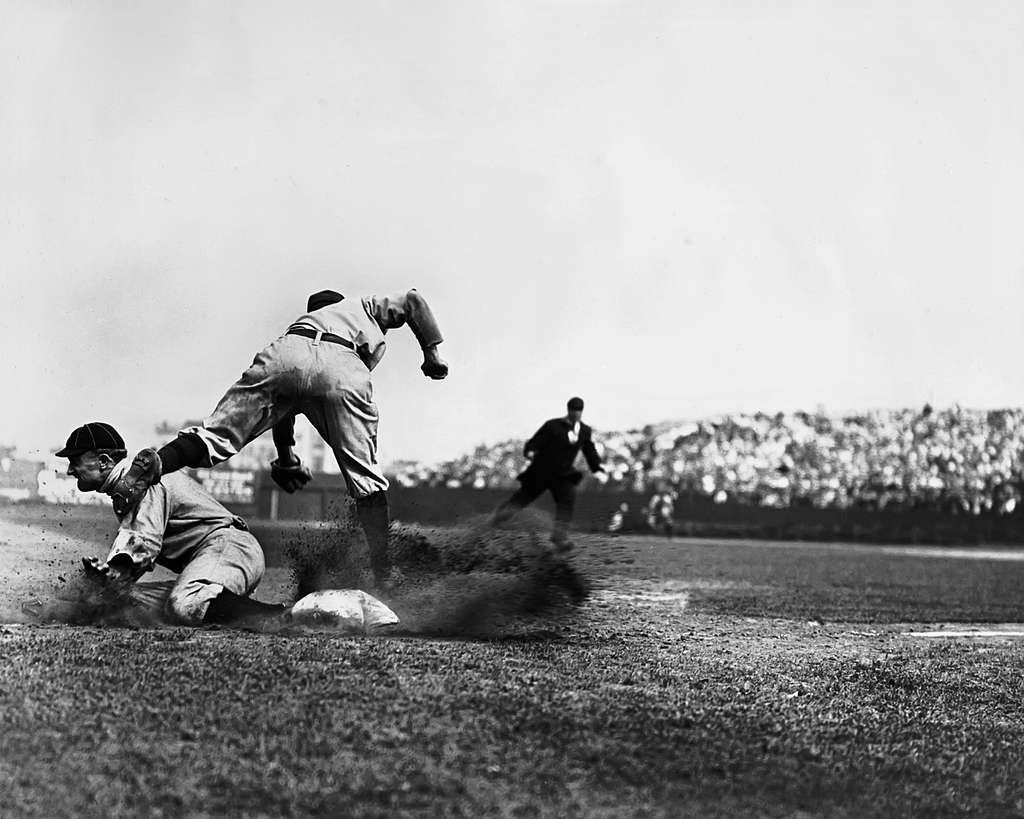
On May 15, 1912, Cobb was hitting a comfortable .360. He grounded out in his first at-bat against the Highlanders’ excellently named Jack Warhop, and in the third inning Cobb reached on an error and had scratched his way over to third base before the inning ended.
As he came in from center field, instead of heading to his own bench, Cobb walked over to the Highlanders’ dugout, clearly looking for someone who was not there. After a brief and fruitless search Cobb walked back to the Tigers’ bench, but never made it. “With his cap pulled over his eyes and a fierce expression on his face,” Cobb suddenly leaped over a low coop wall into the grandstand behind third base, throwing himself on a fan seated there.
In the long seconds before anyone could react, Cobb “rained hooks, jabs, swings, other assorted punishers” on the man, who was universally dubbed the fight’s loser. After all, one writer said, “Cobb threw all the punches.”
Cobb’s teammates rushed in behind him and pulled their infuriated star off the man beneath him. The game’s two umpires, Silk O’Loughlin and Fred Westervelt arrived, along with half the 3,500 people at the game who had abandoned their own places to “flock to the seat of war.” The crowd grew thick and menacing but the umpires and players succeeded in keeping a riot from breaking out.
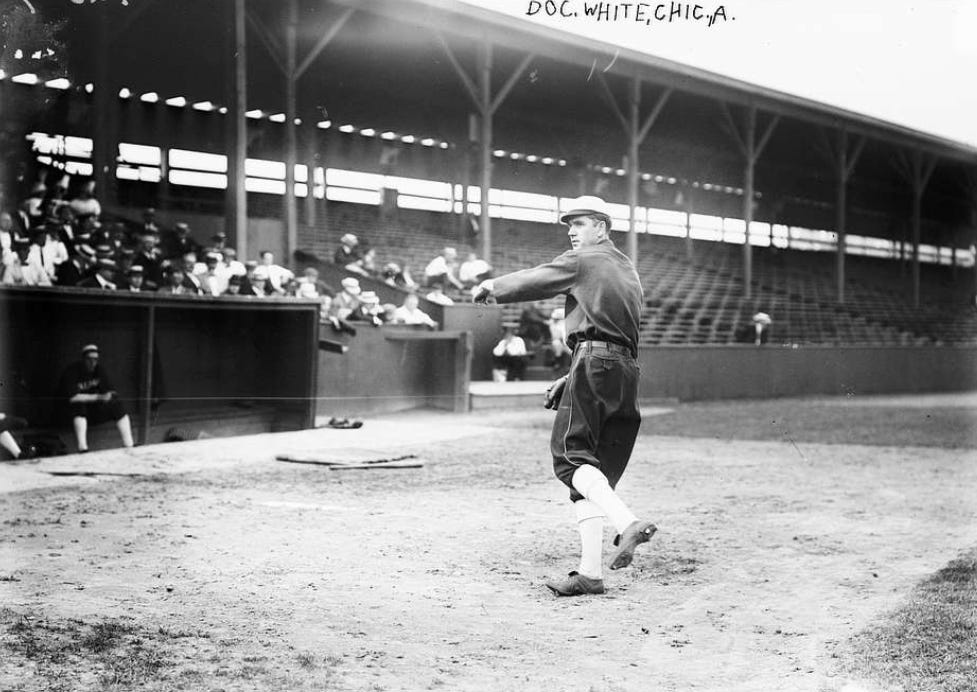
A lack of police or security presence within the ballpark was frequently noted in the initial accounts of what had happened:
The contest was halted for about five minutes while the Tigers and the—count ‘em for yourself, one—policeman was prying the Peach’s fist out of his antagonist’s face.
The umpires, “who liked their peace,” soon put Cobb out of the game. He went to the Tiger’s bench, flanked by his teammates. The Tigers’ manager, Project 3.18 alum and noted flautist1 Hughie Jennings, replaced his star with the only backup available off the bench, while Cobb took that man’s place on the bench.
And as for the fan:
By the time the players had broken up the festival, the abusive fan’s face would have been an excellent model for a hamburger steak manufacturer. The injuries inflicted on Cobb’s antagonist were not of a serious nature, but they yielded a beautiful crop of blood and required the attention of a doctor and the application of much soap and water to make him even moderately presentable.
Once the fan had been cleaned up, the Highlanders’ secretary and the lone security official—a detective contracted out from the Pinkerton Agency—escorted him to a different seat where he could watch the rest of the game from safety.
The game resumed. New York pulled ahead in the bottom half of the fourth but the Cobb-less Tigers came right back with three runs in the fifth and stayed on top from there. Detroit finished off an 8-4 victory with 12 hits (“not counting a dozen or so that the Peach scored in his brief ring career”) off Warhop, who “had nothing to deceive with, and was wild.”
Cobb had made his exit from the dugout in the seventh inning. To reach the visitors’ clubhouse he had to cross in full view of the field, creating an extremely tense moment.
Imagine it. One of the most famous baseball players in America, a man regarded as mean and unlikable, a thorn in the side of every fan in the American League, has just ambushed and beaten a New Yorker sitting in the seat he paid for in his team’s own park. And now that same player must walk, in full view of the crowd, across the field. Given his crime, you might imagine that this departing player would face a storm of boos and a barrage of produce, maybe a glass bottle or five. But here’s what happened as the crowd got another look the man who had just bloodied one of their own:
Fully 80 percent of the crowd cheered and clapped for the Peach as he started his journey across the sward to the dressing room, and the few who hissed were drowned out completely.
As much as they might have disliked Cobb, it seems most of those present liked the fan he assaulted even less.
As far as we can tell, the fan’s name did not enter circulation until the following day, May 16. He was revealed by Damon Runyon, one of the most well-known and influential baseball writers of the time. In addition to covering the Giants for the New York American, Runyon was the primary baseball writer for Hearst newspapers. It’s not clear if the writer used his contacts to track the fan down or if the fan went to Runyon and his national platform to tell his side of the story, but the two quickly hooked up.
Through a simple error of transcription the fan’s name was erroneously reported as Claude Lueker (sometimes Luecker), but his surname was actually Lucker, unless he’d changed it in the two years since his 1910 marriage announcement appeared in a Brooklyn newspaper2.
According to Runyon, Lucker was employed as a secretary to a retired sheriff named Thomas Foley. Runyon mentioned this to subtly point out that Lucker was connected to New York’s still-powerful Tammany Hall political organization. What Runyon did not mention was that Lucker had been severely and obviously disabled while working as a newspaper pressman a year earlier. In an accident involving a heavy newspaper printing press, he lost all of one hand and most of the other.
Lucker had become a well-known figure at Hilltop Park, to both the Highlanders and the members of the seven other teams on the circuit who had to put up with him on a regular basis. He had been known to Ty Cobb for at least a year before their fateful tangle, distinguished by his piercing voice and a steady, determined monologue of abusive language.
In a statement he made on May 16, Cobb said there was history between the two:
The man who attacked me in New York is the same one who has made it unpleasant for me on other trips to that city, and he has continually picked me out as a target for his abuse. Last summer I remonstrated with him and advised him to pass me up—that I was only human and trying to earn my living out there and I could see no justice in his attacking me. His remarks then were insulting but not obscene.
Lucker was a part of a group of park regulars who had been busy throughout the series with Detroit, “engaging in an uninvited monologue for Cobb’s discomfort.”
“As soon as this man got into the park he got after me,” Cobb said. “He did not wait for the game to begin, but started as soon as we had batting practice. In order to avoid him, I walked to the other side of the field and tried not to hear him. [Detroit shortstop] Donie Bush asked him to stop, but it did no good.”
The antagonism spiked in the second inning when Cobb reportedly fumbled a chance in center field. Though he did not receive an error, Lucker and his pals seem to have thought Cobb missed the play, and they “guyed” the center fielder, a period term for jeering or mockery.
Cobb was reported to have told the hecklers off again, but the ensuing conversation “got as rough as No. 2 sandpaper.” Meanwhile, “the grim-faced Pinkerton stood idly within earshot," doing nothing to intervene.
It got so bad, Cobb said, that after the third inning he approached the Highlanders’ bench looking for the team owner, Frank Farrell, to ask for assistance having Lucker removed. Not finding Farrell, Cobb walked back toward the Tigers’ bench and Lucker let loose again, and whatever he said this time sent Cobb literally over the edge.
But what was said, really? We could imagine words in 2025 that could provoke such violence, but what was the standard 113 years ago? What did a guy have to say to get a crowd of people to cheer his assault?
Period accounts fall into one of three categories—what Cobb said happened; what Lucker said happened; and what everyone else said happened.
Lucker’s Version:
This one’s about as credible as you’d expect. In a May 18 interview given to a North Carolina paper, Lucker described making “a shout of derision” after Cobb’s play in the second inning. He said that in response the player singled him out for attack and “made a remark reflecting on Lucker’s family.”
Lucker said that when Cobb went looking for help near the Yankees’ bench, someone called out “Oh, you dope!” Cobb returned to the third base line and addressed Lucker:
“Yes I’m dopy, and you know what made me dopy; the same thing that made me dopy yesterday.”
These (apparently) barbed words led to “an exchange of epithets,” or, as Runyon put it, “language scarcely fit to eat.” Mothers and sisters seem to have been targets on both sides, making this the argument’s likely point of no-return.
Lucker said Cobb climbed into the seats with his teammates at his back. In later accounts he’d say they came armed with bats—these tales always grow in the telling. Lucker said that as Cobb rained blows on him someone shouted to Cobb that he was attacking a man with no hands. Cobb’s infamous reply: “I don’t care if he has no feet.”
Cobb’s Version:
Cobb’s earliest statement on the incident seems to have appeared in the Detroit Free Press on May 16. The story would explode nationally a day later, and at that point everyone involved began regularly revising their version, making this initial account more valuable. In it, Cobb explained he’d tried to deescalate the situation:
I tried to find a representative of the New York club with sufficient authority to have the man ejected but could not locate one, so I was exasperated beyond all endurance finally and struck the fellow.
The Free Press statement concluded with Cobb sharing one detail on what was said. In fact, his quote may have actually been cleaned up for publication, but it’s the closest thing we get to specificity:
“When a spectator calls me a ‘half-negro’ I think that it is about time to fight.”
So, we don’t want to “protest too much” here, but some context is necessary3. You may or may not know that Cobb has long been portrayed as a virulent bigot, even for his times, but recent research has failed to substantiate this reputation, revealing instead that Cobb generally treated everyone the same way—poorly.
With that said, it’s obviously telling that of all the nasty things Lucker said to him, this is the one Cobb holds up as the worst. But it’s also telling that his statement caused little controversy, not in Detroit, New York, or anywhere else. Instead, the response seemed to be generally understanding, even sympathetic: “Oh, well, that certainly explains what happened.” In Cobb’s society, the idea that violence was a proportionate response to someone questioning a White man’s race seems to have been broadly held.
Everyone Else’s Version:
The social mores of the times prohibited newspapers from actually printing what they understood had been said between Lucker and Cobb, so most of what we have in print are subjective assessments. Many of these reflect that, rather than just one triggering word or phrase, quite a lot of awfulness was said.
The Detroit papers were predictably for Cobb, characterizing Lucker’s words as:
...decidedly personal and offensive…
...disgusting language and unspeakable insults…
...names of an unprintable character…
But the New York papers, Lucker’s hometown press, came down even harder:
...shameful abuse…
...mining camp talk…
...that has no place in a family newspaper or even one that circulates in barber shops only.
...language was of a kind no decent man ever uses and no man of the slightest pretense to respectable appearance could possibly utter in mixed company.
…not only profane, but vile…
An overwhelming majority of commentators declared that Lucker had been way out of line. And Cobb, lacking any support from the authorities, had been within his manly rights in his handling of the situation.
“I think the provocation was sufficient to justify my action,” Cobb said, “no matter how much I may regret that encounter. No self-respecting man could endure such insults, especially after repeatedly warning this persecutor.”
Many of the fans in Hilltop Park that afternoon overheard enough of said provocation to agree with Cobb, prompting them to send him off with cheers instead of chasing him out of the park, but at least one spectator was seated too high up in the grandstand to hear any of Lucker’s abuse.
Ban Johnson had hoped for a quiet afternoon at the ballpark, telling no one he was coming. After a long day, the busy president—normally baseball’s alpha personality—just wanted to be a fan.
The players below did not know Johnson was in attendance—if they had, they certainly would have made different choices. It’s one thing for the boss to read about trouble in the papers, and another if he sees it with his own eyes, and from up in the stands Johnson had seen it all.
Baseball’s original law-and-order executive watched as his biggest star waded into the seats behind his dugout and proceeded to bloody one of the customers. Of Johnson’s reaction, Damon Runyon said that the president “was observed to breathe heavily and to issue words of speech.”
Whatever Johnson’s words, it seems they too were unfit for publication, but he’d have more to say, very soon.
The story continues as Ty Cobb seeks his day in court and the Tigers start a rebellion:
Looking up somebody’s wedding announcement is a real History Flex.
“Some context is necessary” is the #1 most-popular historian tattoo.




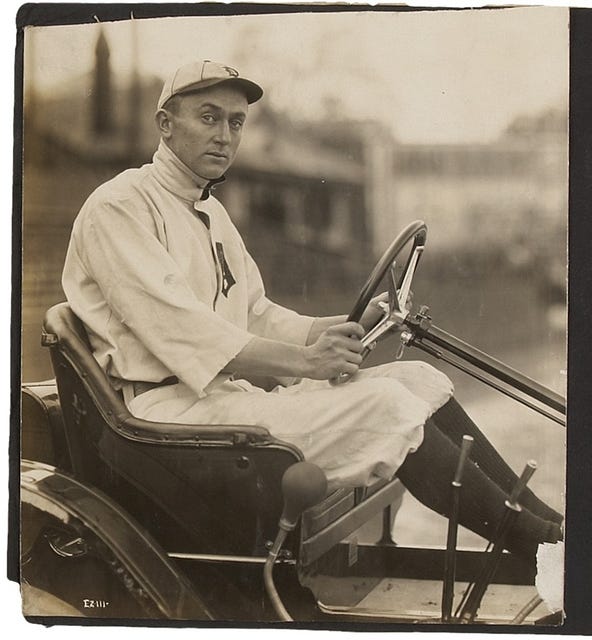
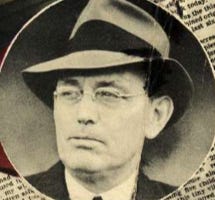
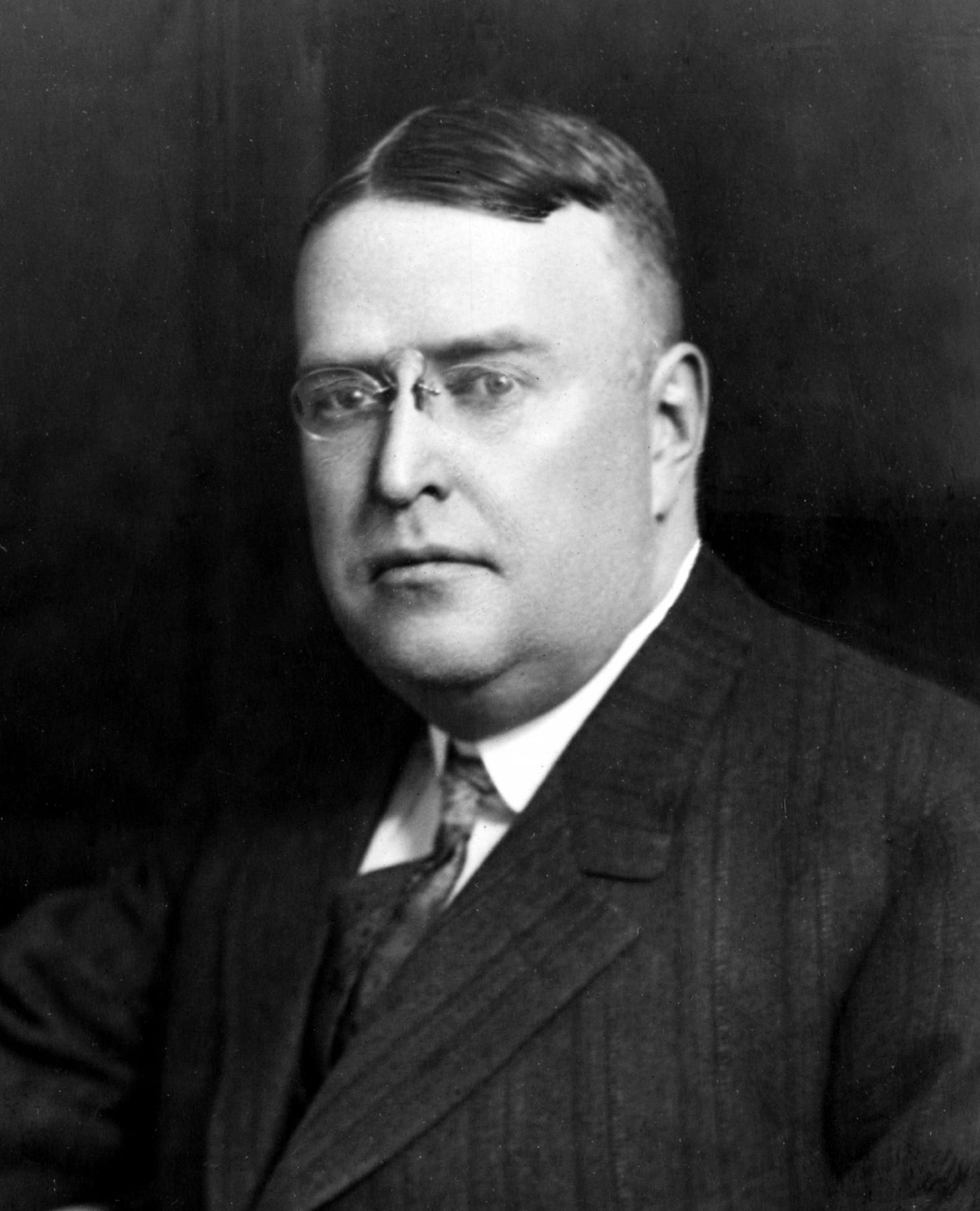

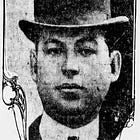
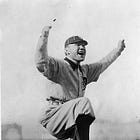
Wonderful post, Paul. I hung on every word; you are really gifted! I just love the “period” language of the people quoted. It’s so formal.
By all accounts, Cobb was detestable. And, he’s in the Hall of Fame. And, I suppose he’ll soon have company: Pete Rose.